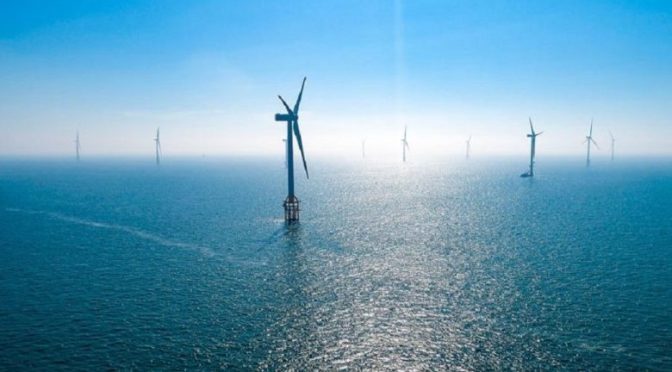The Global Wind Energy Council’s (GWEC) new reports reveal that offshore wind development supports local economic growth, especially in strategic coastal cities such as Incheon, Gunsan and Mokpo.
Offshore wind is vital to meeting South Korea’s net zero goals. But so far only 150 MW of its 14.3 GW offshore wind targets have been delivered, with slow permitting holding offshore wind back. To realise the economic benefits set out in this report, streamlining of currently lengthy permitting processes, which typically takes up to 10 years, must take place.
Today, GWEC released two reports serving as a call to action, urging South Korean policymakers to address key concerns such as permitting and to facilitate the nation’s progress in their energy transition journey.
These reports are action focused – offering guidance on how to build support for offshore wind in local communities and with the fisheries industry. The reports showcase successful international practices and recommend the urgent passing and implementation of the Offshore Wind Power Promotion Act. This legislation is expected to streamline permitting processes to ensure the smooth rollout of offshore wind development in South Korea.
“Offshore wind is a good news story for South Korea. Our new report shows that 14.3GW of offshore wind can create a huge energy and economic opportunity, revitalising coastal communities across the country, and playing a role in halting post-industrial decline.”
“Today we are setting out a blueprint to unlock the pathway to offshore wind growth in a way which benefits local communities and stakeholders. Local consensus through education, engagement and trust-building is a crucial first step to rolling out policies for offshore wind development.”Rebecca Williams, Global Head of Offshore Wind, GWEC
Revitalisation of Coastal Economies
The report, ‘How Offshore Wind Development Can Support Coastal Regeneration’ highlighted the economic benefits local cities could derive from offshore wind:
Over 770,000 jobs in offshore wind across the value chain at different skill levels (these positions include marine engineers, factory workers, business managers, health and safety specialists, and low- and medium-skilled roles such as catering staff, cleaners, and security personnel), if we reach the South Korean government’s 14.3 GW target of offshore and floating offshore wind by 2030.
A staggering economic investment of approximately 87 trillion won from offshore wind project construction over seven years.
To develop a 500 MW offshore wind farm, an approximate 2.1 million direct person-days is required, in addition to various indirect or induced jobs, demonstrating the impactful economic benefits that can be brought about through the industry.
Port investment and developing economic clusters are possible ways that South Korea could employ to further ensure long-term regeneration.
The report recommends that, working closely with industry, local and national governments should put in place a holistic plan to seize the benefits of offshore wind. Local governments can play a key role in implementing a strategic approach to engage key stakeholders, including citizens, early in the offshore wind development process. Empowering the local workforce and strengthening international networks can also support offshore wind development.
Additionally, GWEC encourages the national government to explore increasing the number of Free Economic Zones, develop standardised community engagement guidelines, and continue to provide incentivization mechanisms to facilitate the growth of the offshore wind industry and promote regional economic development.
“Development of offshore wind farms will be a very important opportunity for regions that are at risk of declining. I hope they seize this chance to rejuvenate.”Yunsoung Kim, Professor, Energy and Space Korea
Trust-building enables both offshore wind and fisheries to prosper together
GWEC today is publishing a roadmap for enhanced collaboration and engagement with the fishing industry. This report, titled, ‘Exploring Coexistence Opportunities for Offshore Wind and Fisheries in South Korea’, maps out practical steps that can be taken by industry, local and national governments to enable offshore wind development to cohabit with fishing activities in a mutually beneficial way. The report draws from successful international case studies to formulate key recommendations:
Policymakers to ensure clarity and coordinated efforts between government-led and developer-led offshore wind projects.
Prioritise the passing and implementation of Special Bills such as the Offshore Wind Power Promotion Act to allow clear guidance of future projects, streamline licensing and improve consensus-building with fisher folks.
Conduct post-legislation discussions to address issues facing projects with Electricity Business Licenses (EBLs), defining government roles, and incorporating community coexistence plans as bid requirements.
Provide clear government guidance that progresses viable projects with existing EBLs and recognises them as necessary to meet the country’s renewable energy targets.
Propose that local governments establish public-private councils, formulate regional wind master plans, and encourage collaboration with various stakeholders to prioritise community-focused offshore wind development.
“Fishermen worry about the potential loss of livelihood due to offshore wind development. However, It is possible for fisheries and offshore wind farms to coexist. There are success stories to draw from at an international level and even at home – in Incheon city, where a Government-led approach involving fishermen in site selection was well received.”
“GWEC’s reports acknowledge the local fisheries’ concerns and propose a holistic set of policy recommendations that can benefit both industries and allow for them to thrive in the long term.”Cho Kong-jang, Director General of Sustainability Strategy Research Group, Korea Environment Institute
